GOVERNANCE
| Publication Cover | Title |
|---|---|
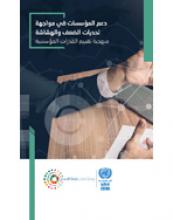 |
Supporting institutions in tackling weakness and fragilities: methodology for institutional capacity assessment E/ESCWA/ECRI/2019/INF.1 Given the central role played by public institutions in all stages of the national development process, and in line with the targets of Goal 16 of the 2030 Agenda for Sustainable Development aimed... |
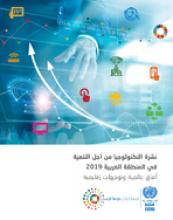 |
Technology for Development Bulletin in the Arab Region 2019 E/ESCWA/TDD/2019/4 The first section is devoted to new technologies. The role of open data and big data within open government perspective is addressed to highlight its potential opportunities and impact on socio-... |
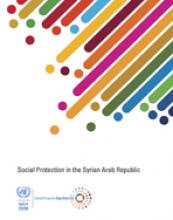 |
Social Protection in the Syrian Arab Republic E/ESCWA/SDD/2019/TP.12 This country profile outlines the statutory social protection system in the Syrian Arab Republic including social insurance, social assistance, and social health-care provision. It furthermore... |
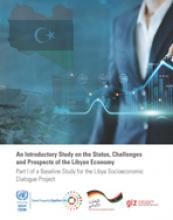 |
An Introductory Study on the Status, Challenges and Prospects of the Libyan Economy E/ESCWA/CL6.GCP/2020/TP.3 The Libya Socioeconomic Dialogue Project is managed and implemented by the United Nations Economic and Social Commission for Western Asia (ESCWA), thanks to a funding by the German Federal... |
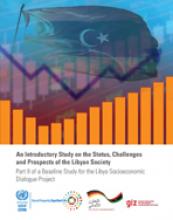 |
An Introductory Study on the Status, Challenges and Prospects of the Libyan Society E/ESCWA/CL6.GCP/2020/TP.2 The Libya Socioeconomic Dialogue Project is managed and implemented by the United Nations Economic and Social Commission for Western Asia (ESCWA), thanks to a funding by the German Federal... |
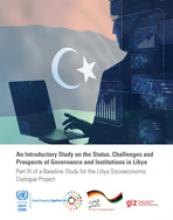 |
An Introductory Study on the Status, Challenges and Prospects of Governance and Institutions in Libya E/ESCWA/CL6.GCP/2020/TP.1 The Libya Socioeconomic Dialogue Project is managed and implemented by the United Nations Economic and Social Commission for Western Asia (ESCWA), thanks to a funding by the German Federal... |
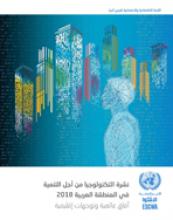 |
Technology for Development Bulletin in the Arab Region 2018 E/ESCWA/TDD/2019/1 This publication aims to present the main global trends in technology and their impact on government work, integration and transformation, in addition to Internet neutrality. It also addresses... |
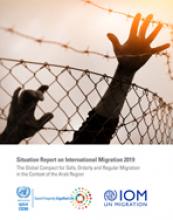 |
Situation Report on International Migration 2019: The Global Compact for Safe, Orderly and Regular Migration in the Context of the Arab Region E/ESCWA/SDD/2019/3 The third edition of the Situation Report on International Migration comes at a time of unprecedented levels of international migration in the Arab region. The region hosts over 38 million... |
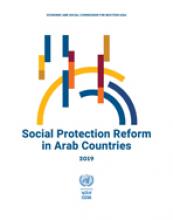 |
Social Protection Reform in Arab Countries E/ESCWA/SDD/2019/1 Social protection systems, their design and their extent, are shaping social cohesion, social justice, the structure of the labour market, the prevention and alleviation of poverty, as well as... |
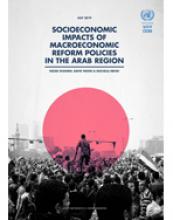 |
Socioeconomic Impacts of Macroeconomic Reform Policies in the Arab Region E/ESCWA/EDID/2019/TP.1 The technical paper aims to test that hypothesis by evaluating Tunisia and Egypt’s experiences with neoliberal adjustment against the SDGs. The UNESCWA expert group meeting Towards... |
 |
Women in the Judiciary: A Stepping Stone towards Gender Justice E/ESCWA/ECW/2018/BRIEF.1 The limited presence of women in the judicial branches of Arab States is attracting increasing attention as an obstacle to the development of representative institutions and the achievement of... |
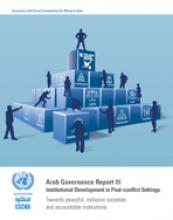 |
Arab Governance Report III: Institutional Development in Post-conflict Settings E/ESCWA/ECRI/2017/4 The third edition of the Arab Governance Report introduces post-war best practices from international and regional experiences. It suggests strategies and policies for Libya and Yemen that focus... |
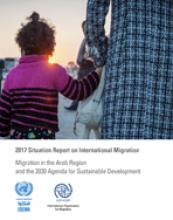 |
2017 Situation Report on International Migration: Migration in the Arab Region and the 2030 Agenda for Sustainable Development E/ESCWA/SDD/2017/1 This report describes the main trends and patterns in international migration in the Arab region from 2015 to 2017, provides a summary of important developments in migration governance in... |
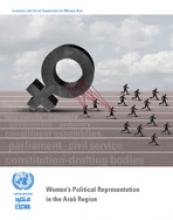 |
Women’s Political Representation in the Arab Region E/ESCWA/ECW/2017/3 This study examines the status of women’s representation at several levels of governance, including the legislative, the executive, the judiciary, the public service, and local councils,... |
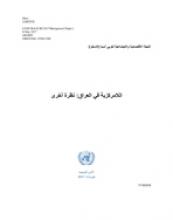 |
Decentralization in Iraq: Another perspective E/ESCWA/ECRI/2017/BACKGROUND PAPER.1 Despite officially adopting a-symmetrical federalism since 2005, Iraq’s state structure has remained high centralized. In light of the emerging consensus that decentralization is imperative for... |
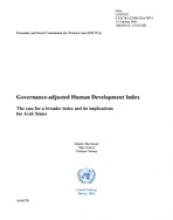 |
Governance-adjusted Human Development Index: The case for a broader index and its implications for Arab States E/ESCWA/EDID/2016/WP.3 Governance is the most important factor in explaining deviations in broad human development over time. Therefore, this paper contributes to the literature on improving human development... |
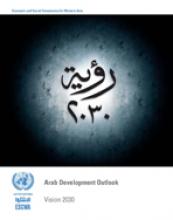 |
Arab Development Outlook: Vision 2030 E/ESCWA/EDID/2015/3 The Arab region is in crisis and it is easy to succumb to pessimism about its future. This report, however, embraces a vision of hope: one that illustrates the... |
 |
Arab Governance Report II: Governance and Institutional Transformations in Conflict-affected Arab Countries E/ESCWA/ECRI/2016/1 Today, conflicts of varying intensity directly affect at least half of the Arab countries, while the rest endure neighbourhood or spillover effects, impeding peoples’ fundamental right to live... |
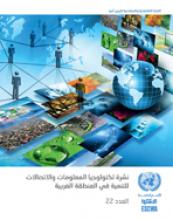 |
Review of Information and Communications Technology for Development in the Arab Region Issue No. 22 E/ESCWA/TDD/2015/2 The world is heading towards defining the development agenda for post-2015, and approving the sustainable development goals (SDGs). Technology plays an important role in driving the development... |
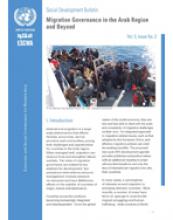 |
Migration Governance in the Arab Region and Beyond Vol. 5, Issue No. 3 E/ESCWA/SDD/2015/TECHNICAL PAPER.4 International migration is a large-scale phenomenon that affects families, economies, service provision and communities, posing both challenges and opportunities for countries in the Arab... |





